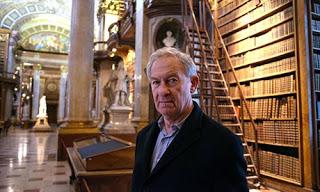 I've greatly enjoyed the first couple of episodes of Simon Schama's Story of the Jews currently airing on BBC2. Schama is a wonderful story-teller and he knows how to make his subject matter compelling and memorable, always very impressive given the constraints of the documentary medium, with the need to summarize, to simplify, to splice and dice.
I've greatly enjoyed the first couple of episodes of Simon Schama's Story of the Jews currently airing on BBC2. Schama is a wonderful story-teller and he knows how to make his subject matter compelling and memorable, always very impressive given the constraints of the documentary medium, with the need to summarize, to simplify, to splice and dice. Because of my admiration for Schama and the current series, I was disappointed to hear the kind of ignorant caricature of Paul that one would normally only see in a sensationalist documentary. About fifteen minutes or so into the second episode, Schama looks at Constantine's conversion to Christianity, and begins to explain how early Christians reacted to Jews and Judaism:
Born a Jew, like his saviour, was Paul who, within a few years of Jesus' death began the process of liberating Christianity from the claims of Jewish ritual. Christianity was either universal or it was nothing. So Paul aggressively de-Judaizes the Christian message and there was no surer way of doing that than insisting on the divinity of Jesus. That violated the first supreme principle of Judaism which was the indivisible oneness of God. Echad. Two: "Father and son" had Jews scratching their beards. Three: "The holy spirit". Why not five?There are several problems with this section of the documentary, all of which could have been simply ironed out if Schama had consulted someone competent in the study of Christian origins. To take them in turn:
And it was Paul who repeated the sinister note sounded in the early Christian Gospels, -- the Jews as Christ-killers crying out for Jesus' crucifixion -- "his blood be on us and on our children".
(1) Although Schama acknowledges that Paul was "born a Jew", the implication is that Paul converted away from Judaism to something different, called "Christianity". But Paul never mentions "the Christian message" or "Christianity" and he would have been appalled by the notion that he "de-Judaizing" anything, still less that he did so aggressively. Paul insists on his Jewish identity and without understanding that, one cannot understand Paul (Phil. 3.4-6, Rom. 9.1-5) or, for that matter, the early Jesus movement. Schama's misunderstanding is a classic one. Paul is an eschatological Jew who believes that the Messiah has come and that the Gentiles are now being included in the people of God. He is not founding a new religion purged of Jewish ritual.
(2) Affirming Jesus as Messiah and God's son did not "violate the first supreme principle of Judaism". On the contrary, Paul believed that Jesus' appearance was an affirmation of that very principle, and he goes to some pains to stress this in his Christological re-affirmation of the Shema (1 Cor. 8.6, "Yet for us there is one God, the Father, from whom all things came and for whom we live; and there is one Lord, Jesus Christ, through whom all things came and through whom we live"). Nor does Paul talk about "the holy spirit" as a person of the trinity -- this is as anachronistic as "Why not five?" is sarcastic.
(3) No one, apart perhaps from some fundamentalists, think that the Gospels were written before Paul. The line that Schama is quoting is from Matt. 27.25 and all contemporary scholars date Matthew long after Paul, some by decades. So Paul is not "repeating the sinister note sounded in the early Christian Gospels", nor is that note found in Paul, who does not have a Passion narrative in his letters.
To reiterate, I think this is a superb documentary and I am a big fan of Schama. But I think this section falls below his usual standards. One of the reasons that this is important is that getting the history right plays a key role in Jewish-Christian relations. Given the appalling history of Christian attitudes to Jews and Judaism documented by Schama, it is worth paying careful attention to what Jews like Paul, right at the beginning of the movement, actually said.
